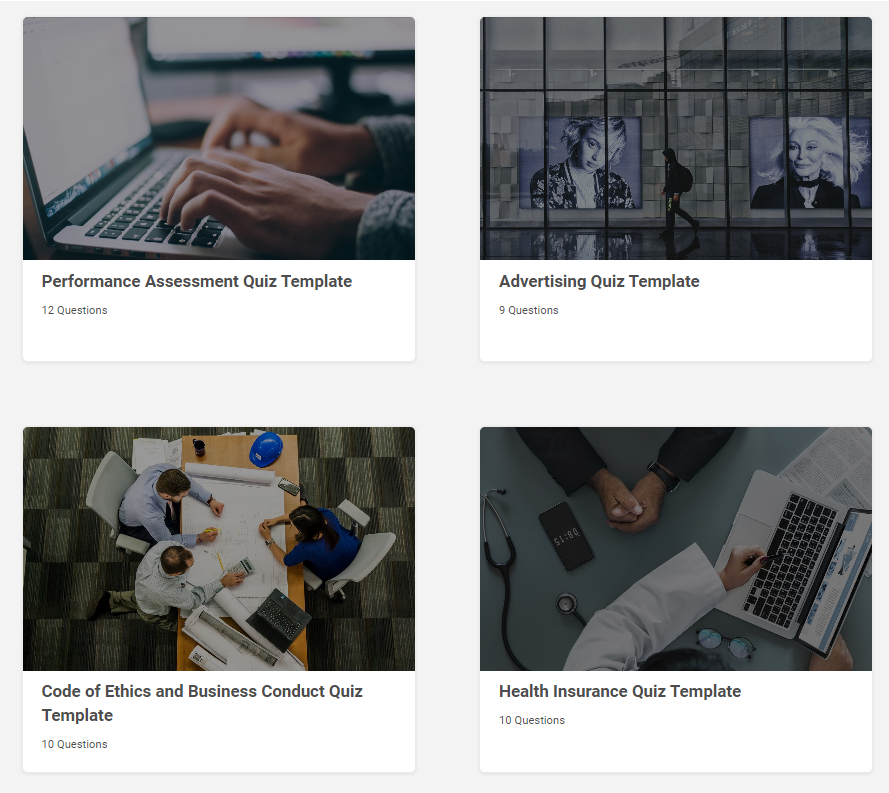Online quizzes are a rage these days. No, we’re not talking just about BuzzFeed quizzes. They sure are one of the most popular categories of online quizzes, but there are several other types of quizzes worth knowing.
Online quizzes can have diverse question formats, scoring patterns, and use cases. The type of quiz you select depends on the audience, the topic, and even the platform you will share it on.
After reading this blog post, you’ll become familiar with the various quiz and question types so you can create the best online quizzes to meet your requirements. We’ll also peek into the process of creating an online quiz.
Let’s begin.
Types of Quizzes
Quizzes are versatile tools for engagement and assessment, each type suited to different needs. Here’s an overview of all the types of quizzes.
1. Scored Quiz
Scored quizzes can be used to test knowledge on any topic and serve various purposes, such as skill testing for hiring, training needs assessment, fun quizzes for marketing, and more.

Features of a scored quiz:
- Each question is awarded specific points.
- The scores keep adding up as the quiz taker progresses through the quiz.
- At the end of the quiz, the sum of the points is revealed as the final result and it’s used to decide how the quiz taker has performed.
Scored quizzes are flexible in terms of the types of questions you can add and how you can grade them. You can use a single question type throughout the quiz or mix and match various formats to make your quiz more engaging.
You can automate the grading for the quiz questions with various grading options, including custom grading, partial grading, negative markings, etc. You can also provide instant feedback for correct/incorrect answers to create a learning opportunity for your quiz takers.
If you’re looking to engage your team or a group of students, you can create a live quiz.
2. Personality Quiz
If you’re an avid Facebook scroller, you may have come across quizzes with titles such as:
“Take This Quiz, and We’ll Tell You What Fruit You Are”
“Do You Know Which Hogwarts House You Belong To?”
“This Quiz Will Reveal the Age at Which You’ll Find Your Soulmate”
Such quizzes that let you discover new information about yourself are called personality quizzes.
Features of a personality quiz:
- Each question has multiple answer choices.
- Every answer choice correlates to one or more personalities.
- At the end of the quiz, the personality with the most correlated options is revealed as the outcome.
The fact that personality or “this or that” quizzes let quiz takers learn something new about themselves makes them a popular and highly shared type of content on social media.
They’re highly engaging, and you can use them for various purposes. For example, you can use personality quizzes for lead generation, increasing website traffic, promoting affiliate products, and more.
You can also use personality quizzes for hiring. Recruiters use them to assess job candidates’ personality traits to find out if their values align with the company’s work culture and if they are a good fit for the role they’re applying for.
Watch: How to Create a Personality Quiz
3. Online Assessment
Online assessments are used to test knowledge, skills, cognitive abilities, or personality traits. They are useful in various settings, such as:
- Trainers can use them to conduct training needs analysis and measure the effectiveness of their training courses.
- Teachers can use them to assess knowledge gaps and learning progress and conduct exams securely.
- Recruiters can use them to simplify their recruitment process and hire smarter and faster.
Regarding recruitment, online assessments are conducted in both scored and personality formats; the format you choose depends on your requirements.
If you need to filter candidates based on their role-specific competency, you can create a scored quiz to test the candidates’ knowledge and skills. On the other hand, if you want to determine if a screened-in candidate would fit well in your company’s culture, you can conduct a pre-employment personality test.
Watch: How to Create an Online Assessment
Pro Tip: Instead of creating pre-hire assessments from scratch, you can pick professionally designed and ready-to-use tests from an assessment library. Doing so saves time and ensures you conduct a comprehensive assessment.
4. Knowledge Quiz
Knowledge quizzes are learning-oriented scored quizzes that help reinforce knowledge of a particular topic or subject. Anyone who instructs a group of people can create knowledge quizzes to complement their educational efforts and help learners understand and retain information.
Teachers can create knowledge quizzes that students can take after they are taught a new topic. Similarly, corporate trainers can create such quizzes for employee onboarding and training programs.
Knowledge quizzes differ from assessments in that they are more formative, meaning they need to be highly engaging.
For example, knowledge quizzes may feature a variety of media and interactive question types. They may also automatically award custom certificates to learners to reward and motivate them.
Watch: How to Create Custom Certificates
5. Trivia Quiz
One of the most popular types of quizzes for fun, trivia quizzes are perfect for engaging users by challenging their general knowledge on diverse topics. They present questions with a set of multiple-choice or true/false answers, scoring users based on their responses.
Trivia questions can be tailored to specific subjects or kept broad, making them suitable for all types of audiences. They are popular on social media for their shareable nature and are often used by brands to drive engagement or by educators and trainers for quick, engaging reviews.
For example, a trivia quiz about company history can add fun to corporate events, while a pop culture trivia quiz can be a hit for online audiences.
6. Lead Generation Quizzes
Lead generation quizzes help businesses find prospective customers.
While most lead generation quizzes you’ll find online are personality quizzes, you can turn any quiz into a lead quiz. All you have to do is include a lead generation form in your quiz to capture your quiz-takers’ information, such as their names, email addresses, etc.
Here’s an example:
Lead quizzes make it easy to get qualified leads. What’s more, you can integrate your lead quiz with top marketing automation tools and make the lead management process easy.
Watch: How to Grow Your Business With Lead Quizzes
Pro Tip: When making a quiz for social media marketing, create upbeat quiz results and add social share buttons on your quiz results page. Doing so improves their shareability and potential for lead generation.
Also, make sure you create an attractive cover for your quiz to boost participation. Here’s an example:
7. Product Recommendation Quiz
A product recommendation quiz is designed to help users find items that best fit their needs or preferences by asking targeted questions. These quizzes feel conversational, often with questions that reveal users’ styles, interests, or goals.
Based on their answers, users receive a tailored list of product recommendations, giving them a curated shopping experience that feels personalized. This quiz type is especially effective for e-commerce and retail brands, as it not only enhances the shopping experience but also increases conversion rates.
Businesses use product recommendation quizzes to provide value to users while subtly gathering insights into consumer preferences. Adding a lead form to these quizzes can further benefit marketing efforts by generating potential leads while delivering a unique, personalized experience to the audience.
Here’s an example:
8. BuzzFeed Style Quiz
BuzzFeed-style quizzes are highly engaging and shareable personality quizzes that offer entertaining results. These quizzes have catchy titles like, “Which City Should You Live In?” or “What Type of Friend Are You?” and usually feature multiple-choice questions where no answer is “right” or “wrong.”
Instead, each choice leads to a fun, personalized outcome that users can share on social media.
Known for their lighthearted tone and social media appeal, BuzzFeed-style quizzes are ideal for brands wanting to increase engagement or build a strong social presence. They help brands connect with audiences in a playful way, subtly promoting brand values or products.
BuzzFeed-style quizzes encourage user sharing, which can increase reach and brand awareness, making them a great addition to any social media or content marketing strategy.
9. Fun Quizzes
You can create various types of quizzes for fun. For example, you can:
- Create a trivia quiz to test your friends’ knowledge and compare results.
- Create a personality quiz for Facebook or any other social media platform.
- Host quizzes on pop culture, company history, and other fun topics during virtual meet-ups with your team.
- Include quizzes in your fun classroom activities.
Fun quizzes bring in a ton of engagement, whether you’re using them to engage employees, students, or online audiences.
Learn how to make a fun quiz
10. Multiple-Choice Quiz
The multiple-choice question format is the most widely used format for both personality and scored quizzes. In a scored quiz, a multiple-choice question presents two or more answer options, of which only one is correct.
But in the case of a personality quiz, there is no such concept of right or wrong answers. The answer options are correlated to different quiz outcomes.
With multiple-choice questions, it’s also possible to present questions and answers with images and videos to make the question more engaging and effective.
Dropdown
In a dropdown question, quiz takers are presented with multiple answer options, just like the multiple-choice question type. But, unlike multiple-choice, the dropdown question type has the answer options hidden in a list that drop-opens when clicked.
Quiz takers can choose from the list and submit their answer. Besides conserving screen space, this question format also makes the question more interactive.
Checkbox (Aka Multiple-Response)
Like the multiple-choice question format, checkbox questions also present multiple answer choices. The only difference is that quiz takers can select multiple answer options in checkbox questions.
For scored quizzes, this means that there can be more than one correct answer.
Here’s an example:
11. Video-Based Quiz
In this quiz type, you upload a video or audio clip and ask questions based on it. This question type can promote active learning by offering an interactive and dynamic assessment experience.
It’s also perfect for testing listening abilities and attention to detail. For example, check out this video quiz that tests learners’ observation skills:
Watch: How to Create a Video Quiz
12. Matching Quiz
In matching quizzes, quiz takers need to match words/images in one list with words/images in another. Matching questions can cover a lot of information, which makes them ideal for knowledge quizzes and one of the most popular types of quizzes for students.
Pro Tip: You can add extra matches to one of the lists to make your matching questions more challenging.
Watch: How to Create a Matching Quiz
13. True/False or Yes/No Quiz
True or False is among the simplest and most often seen quiz question formats. It presents a statement followed by two answer options that are generally “True” & “False” or “Yes” & “No”. Quiz takers choose one of the two options.
Like multiple-choice questions, True or False questions can also be used for both personality and scored quizzes.
14. Fill-in-the-Blanks Quiz
In this question format, the quiz takers need to fill in the missing words and/or phrases in a statement. Quiz takers can type in their answers in the blank boxes. Fill-in-the-blanks questions are great for checking whether learners have a comprehensive understanding of a concept or not.
15. Hotspot Quiz
Hotspot is an image-based and highly interactive type of quiz for students. In a hotspot question, you ask quiz takers to select a particular area of the image as their answer. The hotspot format lets students demonstrate their knowledge via visual identification and is great for knowledge retention.
Watch: How to Create a Hotspot Quiz
16. Audio/Video Response Quiz
The audio/video-response quiz format is one of the most engaging as it doesn’t require the quiz takers to type in their answers. They can respond to the question by recording a video or audio clip in real time or uploading a previously recorded one.
You can choose to let quiz takers respond only by recording in real-time, only by uploading, or both. This question type can be used to create the most engaging quizzes for different purposes. For example:
- Recruiters can use it to conduct remote interviews.
- Teachers can use it to let their students present their ideas and show their understanding of a topic.
- Trainers can use it to assess learners’ understanding.
Audio/video response questions where you only accept responses recorded in real-time are great as an anti-cheating measure. You can also set a recording limit and number of allowed reattempts for such questions.
Watch: How to Create a Video Interview Quiz
17. Drag & Drop Quiz
Drag-and-drop is an interactive question type where quiz takers respond by dragging answer options into blank spaces within a sentence or placing them next to items in a list to create matches.
Drag-and-drop questions provide an excellent way to make formative assessments more engaging. They’re also ideal for creating fun quizzes for social media engagement.
Order List
Order list is a drag-and-drop question type in which quiz takers have to arrange the items in a list in the correct order. Using this question format, instructors can check the knowledge of scientific processes, historical events, and more. It’s also ideal for sequence sorting and data analysis questions.
18. Comprehension Quiz
Comprehension questions evaluate the reading and comprehension abilities of quiz takers. Quiz takers are required to read a passage and answer questions based on it. Comprehension questions are ideal for assessing learners’ reading skills, language proficiency, and critical thinking abilities.
19. Essay/Short-Answer Quiz
The essay quiz format follows a free-response model. Mostly used in scored quizzes, the essay format is suitable when you need to ask for detailed and descriptive answers. You can use this format to assess how deeply the learners have understood a topic.
Pro Tip: You can set a character limit and/or a time limit for your essay questions to make them more challenging and engaging.
Watch: Question Types for Online Learning & Assessment
Now that you’re familiar with the different types of quizzes and quiz questions, it’s time to quickly look at how you can create a quiz online.
How to Create Online Quizzes
Here are five easy steps to create online quizzes for any requirement:
Step 1: Choose what type of quiz you want to create – scored or personality.
Step 2: Pick a template or create a quiz from scratch.
Step 3: Create questions, import them from the question bank, or generate them with AI.
Step 4: Customize the look, settings, and results.
Step 5: Share/assign the quiz using a link, email, website embed, or virtual classroom
If you’re creating a personality quiz, you’ll also need to set up the personalities/personality-based outcomes and map answer options to them.
If you’re creating an exam or assessment, you need to configure these settings to prevent cheating and unauthorized access:
- Add password protection
- Enable remote proctoring
- Randomize the order of questions and answer options
- Disable tab switching
- Disable printing, downloading, and copying
- Add time limits
Watch: How to Create an Online Quiz in Under 5 Mins
Get. Set. Quiz!
That was a roundup of the different types of online quizzes you can create using quiz tools. Whatever quiz type you choose, you’ll need a good tool to create quizzes that help you achieve your training, recruitment, or marketing goals.
ProProfs Quiz Maker lets you create all kinds of quizzes quickly and easily. It has the simplest and most user-friendly interface and all the features you could need to create impactful quizzes.
Additionally, ProProfs Quiz Maker offers an AI quiz generator, 20+ question types, smart settings and customizations, 200+ professionally designed hiring assessments, a library of over a million ready-to-use questions, and lots more.
Frequently Asked Questions
How do I decide which quiz type suits my learning goals best?
To choose the right quiz type, match it to your learning goal. Use multiple choice for knowledge checks, matching to assess connections between concepts, and fill-in-the-blank for recall. True/false is useful for basic understanding, while essay questions are ideal for critical thinking. Drag-and-drop adds interactivity and works well for visual learning. Combining different types gives a more complete assessment of your learners' understanding and progress.
What are the technical limitations of each quiz type when embedded on websites?
Most quiz types work well when embedded, but some formats can run into issues. Video-based and audio-response quizzes might lag on slower connections. Drag-and-drop or hotspot questions can be tricky on mobile. Even simple quizzes can lag if your site is heavy. That said, using a tool like ProProfs Quiz Maker can help you avoid most of these problems. It’s designed to work smoothly across devices, supports all quiz types, and handles grading, mobile compatibility, and load time.
Is it possible to combine multiple quiz types into a single interactive experience?
Yes, with quiz builders like ProProfs Quiz Maker, you can mix multiple quiz types into one smooth, interactive experience. You can add multiple choice, drag and drop, hotspot, matching, or sequencing questions—all in the same quiz. You can also include images, videos, or audio to keep things interesting. If you’re short on time, the AI quiz generator or 100,000+ quiz library can help you get started fast. It also allows you to track scores, set timers, and embed quizzes on your website.

 We'd love your feedback!
We'd love your feedback! Thanks for your feedback!
Thanks for your feedback!







